

by Rachel Smith
17 June 2022
Madeleine Dore is a beautiful writer – and an accomplished interviewer whose long-running project, Extraordinary Routines, will be well-known by many of you. Her blog and the interviews on it formed the basis of her first book, I Didn’t Do The Thing Today – an inspiring and eye-opening read that’s all about productivity guilt, routines and letting go.
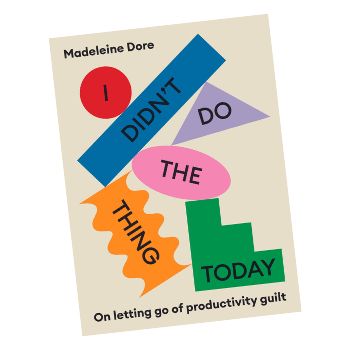
Listen to Madeleine’s episode on our podcast, The Content Byte and read an excerpt of her fantastic book, I Didn’t Do The Thing Today.
… there can be an exceedingly high bar to rise to: to get up at a certain time, to attend to a long to-do list, to somehow be everywhere at once. And when—even with the hours swaddled by our plans—the day unfolds differently, we encounter a familiar sense of guilt and self-blame. But perhaps the reason we didn’t do the thing today isn’t because of our shortcomings, but simply that our expectations of the day were too great.
Such expectations often come hand-in-hand with excessive standards—perfection, constant improvement, upward trajectories, success, doing more. When we fall short, instead of adjusting our expectations, we create more for tomorrow: I should wake up earlier. I should be more productive. I should be more organised. I should exercise more. I should have finished this project by now. I should get my life together.
Sure, some of these things might bring vitality into our days, but the worrisome word here is should. When we grasp too tightly onto how something should be, we can be knocked over by the slightest change—even if it’s inconsequential, or even if it’s positive. It’s not what we expected, what we deserved.
* * *
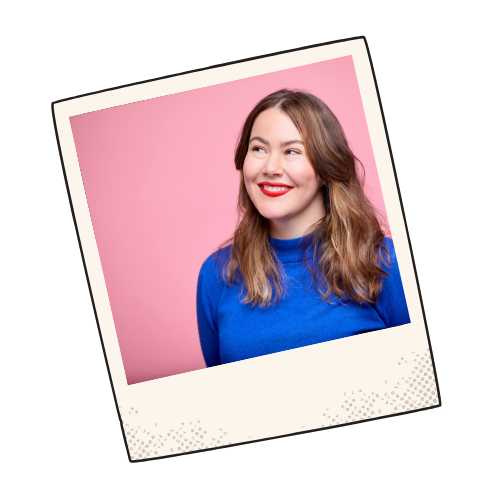
… or the hope that comes with them, but rather learn how we can let go of our attachment to particular outcomes. By definition, an expectation is a strong belief that something will happen or will be the case. There’s an element of certainty to an expectation. For better or worse, it’s a feeling that there is a guarantee—it’s a bid for control, when of course we can’t control the future. Just like feelings, expectations shift and move. Yet we are disappointed when something moves beyond our grasp. So we hold on tightly, make plans or add more shoulds—only for them to shatter. As Brandon Sanderson wrote in The Way of Kings, ‘Expectations were like fine pottery. The harder you held them, the more likely they were to crack.’
We think we’re controlling our lives by setting up expectations, but we can be narrowing them. I have long tried to pin down my expectations by turning them into plans. I’d make list upon list of everything I want to do in the next decade, year, month and week, and make a daily event out of trying to mould my life to exert control. I recently found one list that I drafted when I was 27. It was a list of 100 things I wanted to do before I turned 30: run ten kilometres, publish a book, take singing lessons, learn a language, ferment foods, live in New York City, live in the Italian countryside, deliver a TED Talk, live alone in an apartment I own, have an amorous love affair. I distributed each of these to-do items across five six-month blocks, convinced my life plan was taking shape in a spreadsheet. I didn’t realise it was actually in the sky.
Of course, planning can give shape to the day. As I overheard a teenager say at the bus stop, ‘If I don’t have anything planned I just stay at home and then feel disgusting about myself.’ Some level of planning is necessary so we don’t feel like shapeless blobs, but also to manage conflicting priorities, demanding schedules, or to ensure we don’t delay others. But there is a difference between planning that is preparation and planning that is driven by anxiety, restlessness or fear of uncertainty.
Whether it’s how our careers will pan out or the outcome of an election, uncertainty can make our days feel unsteady. A plan, a list, an expectation for how things will go is a way of stepping outside our life in order to control it—if I am the creator of a plan of 100 things I want to do, then maybe I can influence how my future will unfold. I have noticed in myself and others that in writing a plan, I’m searching for more than order—I’m trying to pinpoint where I can exercise control and eliminate my fear of the unknown. I’m creating a vision for my future self where the tumbles of today will no longer get in the way.
But our plans don’t shield us from the unknown and the stumbles—our days unfold in unexpected ways, list or no list. A plan is an attempt to write a future so it feels more certain, more ideal, more productive, more pleasant, but it’s often in vain. As Arnold Bennett wrote in his 1908 book How to Live on 24 Hours a Day, ‘If you imagine that you will be able to achieve your ideal by ingeniously planning out a timetable with a pen on a piece of paper, you had better give up hope at once.’
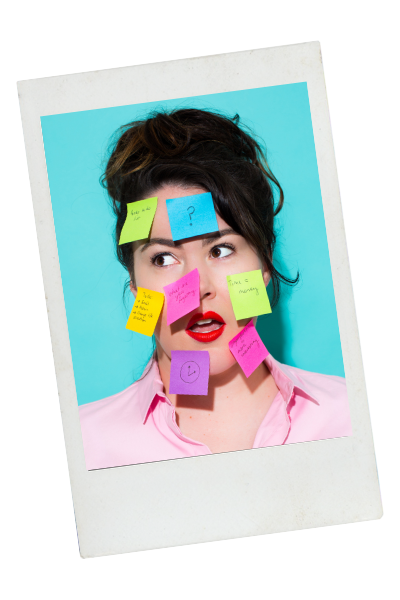
… but we can loosen our grip on our desire for certainty. We can change our great expectations of our future self, and relieve some of the pressure. When I find myself grasping my plans too tightly, I try to soften them into intentions rather than expectations. An intention is lighter—it’s an aim, rather than an assumption. It’s a gentle guide, where an expectation is a prescriptive outcome. Where expectations fixate on how a goal should look—say, to cook the perfect meal—intentions emphasise the experience around the goal—say, to enjoy the meal with the people you love.
A few years ago, I made this shift from expectations to intentions in how I framed my new year’s resolutions. Instead of writing down an overcrowded list of unrealistic goals that would inevitably lead to disappointment, as well as guilt, anxiety or shame, I now pick just one word as a gentle focus: 2018 was joy; 2019 was momentum; and 2020 was trust. It proved to be a salve for many uprooted plans, an anchor during a time of amplified uncertainty. There’s no outcome or expectation; holding a word allows for the shift and invites us to become curious about it.
An intention can show us the way, but it doesn’t predetermine the way. This reminds me of how the designer Ryder Carroll—the creator of the popular Bullet Journal method—described his approach to setting goals. He chooses to see them as lighthouses, since a ship never steers towards the lighthouse; it’s used as a guide. As Ryder told me, ‘Redefining our goals as guides rather than destinations takes the blinders off. It helps us shed our expectations, and allows us to take in the whole picture.’ Intentions can be lighthouses that illuminate the safe passages to follow, but also that allow us to adjust course as necessary. Sometimes we’ll find ourselves at a destination we did not expect.
Intentions have far less of a pile-on effect, I think. Expecting so much of ourselves can curtail our ability to do something—either by exacerbating our feelings of being already behind or by setting us up to fail. When we don’t do something right the first time, or when we fall short of our expectations, we can take it as proof that we’re incapable and never try again.
Perhaps we’d do better to ask whether the expectations we set are unrealistic to begin with. When I spoke with the writer Ashley C. Ford, she told me how setting unrealistic expectations for herself was essentially an excuse. ‘It was a way for me to convince myself I’m not the kind of person who can do a certain thing, when the truth is, maybe you’re not the kind of person who over a weekend can decide to give up sugar, start waking up at six o’clock, start meditating, start learning calligraphy, and all this other stuff. Maybe you are the person who could wake up a half-hour earlier tomorrow.’
You haven’t failed—you’ve simply failed to meet an expectation that was perhaps discretionary or too great to begin with. To hold something lightly, it must be right-sized. Maybe, instead of expecting ourselves to overhaul our lives completely, we should pick just one small thing? Instead of expecting ourselves to write a thousand words each morning, why not focus on just one paragraph? Instead of starting training for a marathon, why not jog around the block?
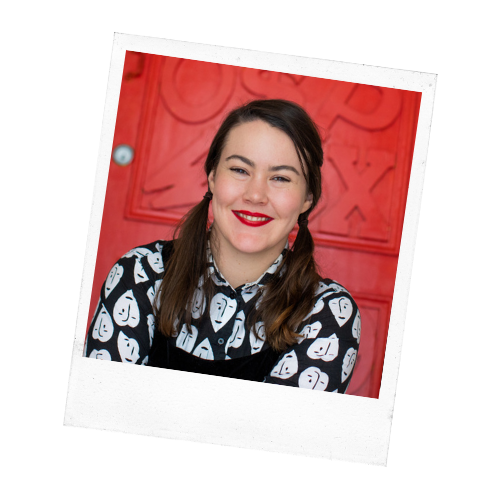
… to attempt to do too much at the beginning—to try and hold something that’s too heavy. But one of the greatest antidotes to the overwhelm of expectation—and we also find this when facing distraction, limitations and discipline—is to start small. Expectations can be stifling because they ignore our tendency to make mistakes, to faff, to flail, to be interrupted and distracted. So maybe set the bar lower. Simplify. Be okay with it taking twice as long. Break your expectations into such small steps that you no longer trip over or are unable to move forward Sometimes, when everything feels particularly uncertain, we don’t need another plan—we simply need to be okay with the unknown and do the thing anyway. Doing the thing often comes before feeling good about the thing—but so often we wait until everything is right and good before we begin something. While planning can increase our motivation, or soothe us from the fear of uncertainty, it can go awry because we aren’t very good at estimating how much is feasible. As an antidote, we can become near-term planners—planning what you’re doing in the next hour is much more feasible than planning for the day, let alone for the next year or decade. As C.S. Lewis put it in The Weight of Glory, ‘Happy work is best done by the man who takes his long-term plans somewhat lightly and works from moment to moment.’ Perhaps that’s what we can actually control—doing the thing in the moment we are in. We can also trip over our negative expectations—after all, an expectation can be one of dread just as much as of hope. We can see an opportunity and tell ourselves that we’re not good enough. By rejecting ourselves before others reject us, we hold ourselves back from the things we want. Again, we can hold our expectations lightly as intentions—we can simply express our interest, put our hat in the ring, ask with curiosity. We can plan less and do more.
Whether we’re daunted or hopeful, how things turn out is bound to be different from what we expect. Looking back at my list of 100 things makes me both chuckle and gasp at myself—who was this 27-year-old who thought she could publish a book, curate an exhibition, buy an apartment and acquire a language in less than three years—as well as learn to ferment, to juggle, to play piano and to sing, and split her time between New York City and Italy? She was hopeful, perhaps, but also hard on herself.
Revisiting that list now, when I’m in my thirties, is interesting. Some things, I see, have worked themselves out—I don’t own an apartment, but I live alone in a rental. I don’t ferment vegetables, but I can play one song on the piano. If we hold a plan lightly, perhaps it will work out. As the poet Wendell Berry said in an interview with Humanities magazine, ‘Unexpected wonders happen, not on schedule, or when you expect or want them to happen, but if you keep hanging around, they do happen.’
Perhaps, instead of a rigid life plan, we can hold wishes for our future selves. In July 2005, the renowned New York designer Debbie Millman took a summer intensive course taught by veteran graphic designer Milton Glaser. He instructed the class to write an essay describing the life they could have had if they’d pursued everything they wanted, with the certainty that they would have had success in each endeavour. Dream big, he said, don’t edit, and be careful what you wish for—there was a magical quality to this essay he had observed again and again in his students.
Millman was not immune to such magic, as she explained to me. ‘I think it was twelve things that I was hoping for and I think eleven of them have come true. They were big, audacious things. It’s spooky.’ Now an educator, Millman has since modified the essay exercise and teaches it to her students at the School of Visual Arts in New York. She has observed that the more detail and care students take in their essays—from what their careers look like to the minutiae of their daily lives in ten years’ time—the more success they ultimately have.
… as opposed to my previous itemised and dated Excel spreadsheet, is that it’s not about looking for specific goals, but looking for a way of life and holding that wish lightly. After it is written, it is best kept tucked away in a drawer, away from view, leaving you open to the moment. Then one day you might stumble on it or return to it, and be surprised by the wishes that have been fulfilled. The exercise also encourages us to be delighted by the possibility of the future, rather than daunted by it. Instead of worrying, we might as well put our energy into our wildest plans and make the most of what we have—and allow unexpected wonders to happen on their own.
Perhaps that’s what we can come to appreciate. When we hold a plan lightly, we can be more attuned to the possibilities that lie before us, rather than fixating on whether everything went to plan. We might even find that the joy is in the cells of the spreadsheet we left blank, or what we have not yet done. I’ve long thought an incomplete to-do list reflected my own sense of incompletion. As the artist Marie Curie wrote in a letter to her brother in 1894, ‘One never notices what has been done; one can only see what remains to be done.’
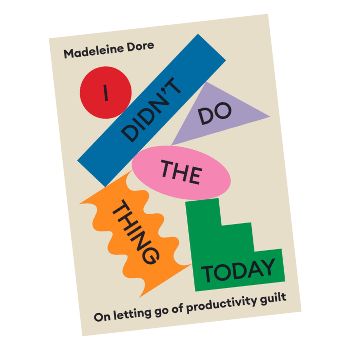
Things began to change for me when I stopped looking at my list as one enumerating my failures, but rather as one of possibilities. There’s a power in the word yet—perhaps we didn’t yet do the thing, and yet we still can. For me, this idea is helpful. Rather than feeling overwhelmed by what’s left to do, we can be guided by it—and perhaps even excited by all the things we still have time to explore. We can sit with the undone, while we also appreciate what we have done.
Thanks to all who entered to win a copy of I Didn’t Do The Thing Today by Madeleine Dore. Congrats to the winners!
Absolutely have the productivity guilt, and I end up losing so much time berating myself!
It’s counter intuitive but I do feel more productive when I am more free flowing and build in more space. When I chunk my day into 30 minute blocks and aim to be productive in every one of them, it doesn’t happen.
Making a time block and then letting things flow works so much better for me!
I can see that 30+ years in journalism and working to non-negotiable deadlines has helped curb my perfectionism but it’s also prevented me from planning for the future.
I’ve never had a 5-year or 10-year plan and since the pandemic I’m even having difficulty committing to dates for an annual holiday because life and work is changing so much and so quickly.
I know I need a new routine, but getting into one is harder than I thought.
But I am practicing deleting the following words from my vocabulary: should, just and sorry.
And that thing I thought I would do today? I’ll try again tomorrow.
Loved the podcast interview! (sadly I only got through the first half while hanging out the washing, the second half is on my TODO list!) … I do love a ToDo list – I use todoist, and while TeDeux sounds good, I’m worried that all my to-don’ts will keep rolling over to the next day and grow into an unmanageable beast… I like the idea of a 10-year to do list … it fits my philosophy of, if you leave it long enough, that thing you didn’t do today that you really don’t feel like doing might just go away on its own! (sadly this doesn’t work with vacuuming)
Listened to the podcast on my walk with the dogs this morning – I find podcasting first thing is a great way to set yourself up for the day and what you choose to listen to can indicate (for me), where I will place my energy and productivity that day. Im a firm believer in working to your energy levels as well – sometimes they will be high and sometimes not! And that’s ok. We are creative people who can’t be expected to be “on” all the time. I value and implement the idea of using our time efficiently (5minute stretch to hang out washing, delayed start on washing machine and slow cookers!) but also think day dreaming, walking, sitting in the garden is a chance for our brain to reboot, ready for the next “on” session.
Productivity guilt was an issue I really struggled with, and I’m still guilty of procrastinating (like a boss!). BUT I’ve also come to realise that you can do a lot more than you think when you plan ahead – just with a plain old desk organiser and to-do list – and include a contingency plan (if this doesn’t get done, I’ll have to do it on Thursday evening rather than going out). On the other hand, I long ago decided that if I was having a total day of it, it’s OK to simply down tools and come back to it later. Much better than staring at a screen and achieving nothing.
I am such a night owl, I enjoy working late into the evening, sometimes even the early mornings. But I have learnt that is what works best for me and I can now ignore any guilt that might come when I hear about colleagues who are up before sunrise working away. You have to do what works best for you. And for me, that includes clearing the chores before I start so I don’t feel I have to leave my home office to get them done.
I occasionally work off a ‘todo’ list, but I now find a whiteboard with a calendar (thanks K Mart) allows me to see my workload for 28 days and I think that works really well for me as I’m a visual person.
I don’t beat myself up if that ‘thing’ hasn’t been done today, like I used to. Unless of course it was a deadline. But I’ve not missed a deadline yet, so my funny, juggly, jiggly way of doing things must be working ok.
Great Podcast episode – so many awesome takeaways.
Thank you Rachel, Lynne and Madeleine
I love to-do lists but do get carried away and then feel overwhelmed at the amount still to tick off! Then I enter a cycle of procrastination, which inevitably takes away precious time aaaaaaaand the cycle continues.
I’ve started sticking to three goals per day – rather than things to ‘do’, list three milestones or achievements I’d like to see fulfilled by each day’s end. It’s been a game changer in helping me prioritise and also feel like I’ve gained ground with just three things per day.
I feel like I deal with productivity guilt all the time! I feel like I’ve wasted a day if I’m not doing something that will help future me. But then procrastination gets the better of me so it’s a never ending cycle. I’ve found that the only thing that works so far for me is to bite the bullet and force myself to do things. It’s so true how they say action increases motivation.
I’m constantly beset by productivity guilt, and I’ve yet to find a routine that actually works for me. I’m still learning to reconcile my realistic capacity with the fantasy that I’ll Do All The Things.
I love the shift from expectations to intentions; the evolution of view from rigid goals to even a gentler focus of feelings; a To Be list rather than a To Do list. Also appreciate the power of near-term goals and the quote: ‘Happy work is best done by the man who takes his long-term plans somewhat lightly and works from moment to moment.’
Would love to read this book fully!!